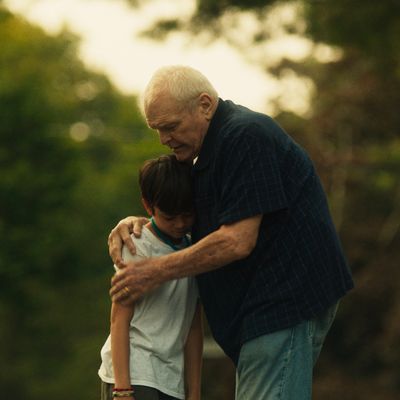
The great Brian Dennehy, who died last month at the age of 81, often thundered with the best of them. A broad-shouldered bear of a man, he could — when the situation called for it — bring an explosive, petrifying intensity to his parts. (In just a few moments of screen time in Terrence Malick’s otherwise ethereal Knight of Cups, he briefly sends the entire movie spinning in a Shakespearean direction.) But he did his best work, I’d argue, in a minor register: Watching him sit there and think, or even just be, was electric in its own right.
It is that Brian Dennehy that we get in Andrew Ahn’s Driveways, a fragile flower of a film that works on the viewer in sly, mysterious ways. The actor plays Del, the reserved Korean War veteran and widower living next door to a house that single mom Kathy (Hong Chau) and her 8-year-old son Cody (Lucas Jaye) have just pulled into. Mother and child aren’t exactly moving in, however: Kathy has come to clear out her older, recently deceased sister Alice’s home, but upon entering the house, Kathy realizes that Alice, from whom she was estranged, was a hoarder, and a neighborhood enigma who kept her distance from everyone else. Which means that mother and child will have to stay in the house (or really, in the enclosed back deck, since the house itself is currently uninhabitable) for a while.
At first, the relationship between Kathy, Cody, and Del is tense — few words are spoken, and the headstrong Kathy is very protective of her sensitive boy. Ahn has an understated style that doesn’t try to lead the viewer or to underline the emotions in the film. We may or may not worry, upon seeing Del’s Korean War–veteran hat and his initially terse demeanor, that he might view these newcomers with suspicion; of course, that might also be why Kathy initially views him with suspicion.
But no, the quiet old man next door is just quiet and old. At nights he eats dinner by himself, saying nothing, just casually staring into space, the film adopting the lonely rhythms of his existence. Watching Brian Dennehy eat is like staring at a great, big novel; you can tell there’s a whole universe in there, but you also know that it would take some effort to understand it. (Driveways premiered at film festivals early last year, so this is probably not the last we’ll see of the late actor, though it’d be a great one to go out on.) Del and Cody strike up a friendship, but it’s a shy one, befitting both their styles. There are no real-life lessons being learned, other than the most important one, which is to be kind and let people be themselves. The title may well be a metaphor for the elusive human connections we make before we go into our own little worlds, the interiors of which others rarely see.
There are no real plot points in Driveways, either; instead, there are elements that could become plot points in a different, probably lesser work. Del likes to spend his days at the local VFW with a small group of fellow veterans; one of them has clearly begun to suffer from some sort of dementia, but the film doesn’t dwell on this potentially tragic thread. Del is accepting of his friend’s lapses, and so is the movie — as if to say, This is just what happens sometimes. Kathy’s husband makes a remote appearance via a brief phone call, and we learn very little of their relationship; again, this could have become a whole thing, but it’s to the film’s credit that it doesn’t. Similarly, Kathy’s realization that she never truly knew her sister — and that she never truly will — lingers there, like one of those thoughts you never know what to do with.
There can be a very fine line between a movie that is delicate and understated and a movie that is lazy and undernourished. Ahn is slowly perfecting the former. His directorial debut, Spa Night, was a lovely, similarly glancing gem about a young gay Korean-American man’s sexual awakening while working at a sauna; on paper it probably went nowhere, but onscreen it came alive with desire and shame and heartache and fear. Driveways has that same quality: It builds a deeply moving emotional journey out of the simplest, most mundane elements. By the end, almost nothing has happened, and yet you’re a wreck.
More Movie Reviews
- The Accountant 2 Can Not Be Taken Seriously
- Another Simple Favor Is So Fun, Until It Gets So Dumb
- Errol Morris Has Been Sucked Into the Gaping Maw of True Crime


